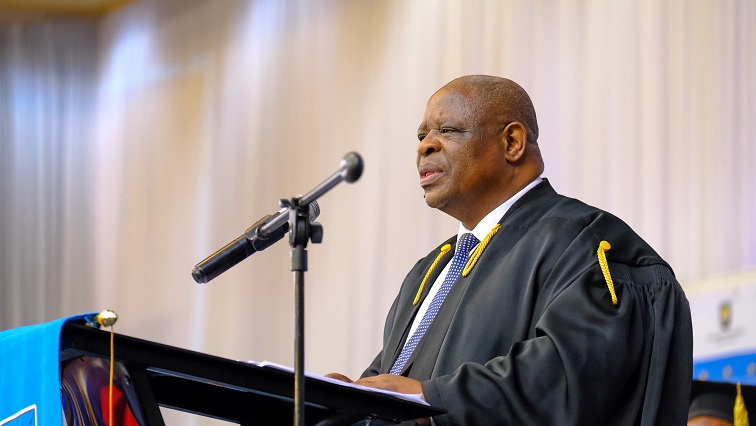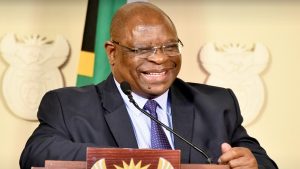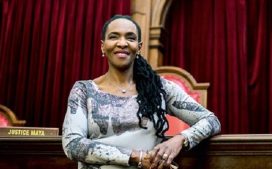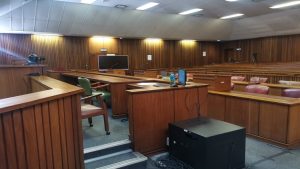The judiciary watchdog, Judges Matter, says Chief Justice Raymond Zondo did not breach the Judicial Code of Conduct for his recent comments at the OR Tambo public lecture at Fort Hare University.
The advocacy group says Zondo did not willingly or inadvertently involve himself in political controversy.
The Chief Justice was critical of the ANC as a political party, as government, and as the majority party in Parliament. Zondo said by allowing what he called the Gupta-Zuma state capture to happen, they betrayed the late former party president Oliver Tambo.
During the lecture, Zondo reflected on various issues of national concern, saying Tambo would turn in his grave for some of the current state of affairs under his fellow comrades.
He told the audience that the governing party failed to prevent state capture.
“By allowing the Guptas-Zuma state capture to happen as was found by the State Capture commission, the government and the ruling party betrayed Oliver Tambo. The majority party in parliament which included members of the executive who were members of the National Assembly, prevented the institution of Parliamentary inquiries which would have revealed at a very early stage, serious evidence of stage capture before a lot of taxpayer’s money could be stolen by the Guptas. They said that investigations should be conducted by the law enforcement agencies that they knew were unlikely to reveal anything, or that it would in any event take years to complete, while the Guptas and Mr Zuma were continuing with their state capture projects to the detriment of the people of South Africa”.
Judges Matter’s Senior Researcher Mbekezeli Benjamin says the code of conduct restricts judges from getting involved in activities that would affect the independence and integrity of the judiciary.
Benjamini, however, says judges are allowed to participate in activities such as public lectures.
“Articles 11 and 12 of the Judicial Code of Conduct limit and restrict the kinds of activities that a judge may be involved in. For example, a judge may not be involved in any activity that is likely to draw controversy to that judge or to the judiciary as an institution. These limitations are there to protect the independence and integrity of the judiciary. However, within the code of conduct, there are certain activities that are allowed that a judge may participate in. These include giving a public lecture or a speech on a topic of the law, the judiciary or the administration of justice. Through these activities, a judge advances public debates on important issues affecting the institution of the judiciary. Through these activities, a judge advances public debates on important issues affecting the institution of the judiciary”
Mogoeng vs Zondo
Former Chief Justice Mogoeng Mogoeng had to apologise after the Judicial Conduct Appeals Committee’s decision to uphold the findings of the Judicial Conduct Committee.
The Appeals Committee agreed with the JCC’s decision for Mogoeng to issue an unconditional apology for his pro-Israel comments.
He was found guilty by the Judicial Conduct Committee following a complaint that was laid by the South African Boycott Divestment Sanctions Coalition, Africa4Palestine and the Women’s Cultural Group.
Mogoeng made the pro-Israel comments at a Webinar hosted by an Israeli newspaper the Jerusalem Post in June 2020.
In January 2022 the majority of the Appeals Committee members said Mogoeng must release a copy of his apology to the Office of the Chief Justice and the media within 10 days of their decision.
The video below is Mogoeng’s apology
Mogoeng was found to have involved himself in extra-judicial activities which are incompatible with the confidence and the impartiality of Judges.
However, has Justice Zondo also attracted possible scrutiny for his conduct? Benjamin says the current Chief Justice did not breach the judicial code of conduct for all the comments he made at the OR Tambo Public Lecture.
“Recently, the Chief Justice gave a lecture at the University of Fort Hare where he reflected on his time as the chairperson of the State Capture Commission. This is an important context to remember, as the Chief Justice was speaking primarily on issues that were reported on at the commission or were included in the final report. And therefore, he could not have been said to have willingly or inadvertently drawn himself into political controversy because he was reflecting on an important responsibility as the Chairperson of the State Capture Commission of inquiry, but also reflecting on aspects of the administration of justice and the law,” Benjamin emphasised.
Zondo term
Meanwhile, Zondo who was appointed Chief Justice on April 1, 2022, still has over 17 months left in office. His twelve-year non-renewable term as a constitutional court justice will come to an end at the beginning of September next year, at the age of 64.
This as the Constitution allows constitutional court judges to only serve a non-renewable term of twelve years or until they reach the age of 70, depending on which one they reach first.
The Constitution also states that the term of office of a Constitutional Court judge can only be extended by an Act of Parliament.
Zondo was appointed a ConCourt judge effectively from September 1, 2012, and has already served close to eleven years as a judge at the highest court of the land.
More details in the report below:






